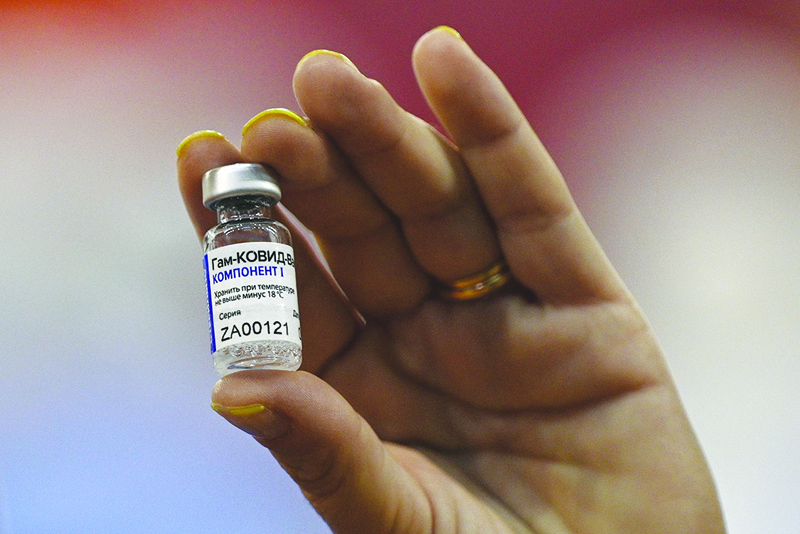 BUENOS AIRES: A health worker displays a vial of the Sputnik V vaccine against COVID-19 yesterday. - AFP
BUENOS AIRES: A health worker displays a vial of the Sputnik V vaccine against COVID-19 yesterday. - AFPPARIS: Russia's Sputnik V vaccine is 91.6 percent effective against symptomatic COVID-19, according to results published yesterday that independent experts said allayed transparency concerns over the jab, which Moscow is already rolling out. Sputnik V - named after the Soviet-era satellite - was approved in Russia months before results from its final-stage clinical trials were published, leading to skepticism from experts.
But the new analysis of data from 20,000 Phase 3 trial participants, published in The Lancet medical journal, suggests that the two-dose vaccination offers more than 90 percent efficacy against symptomatic COVID-19. "The development of the Sputnik V vaccine has been criticized for unseemly haste, corner cutting, and an absence of transparency," said a joint independent commentary by Ian Jones of the University of Reading and Polly Roy of the London School of Hygiene and Tropical Medicine.
"But the outcome reported here is clear and the scientific principle of vaccination is demonstrated, which means another vaccine can now join the fight to reduce the incidence of COVID-19." The results suggest Sputnik V is among the top performing vaccines, along with the Pfizer/BioNTech and Moderna jabs that also reported more than 90 percent efficacy. Pre-empting the results of the phase 3 trials, Russia has already launched a mass inoculation campaign for citizens 18 and older.
Kirill Dmitriev, head of the Russian Direct Investment Fund, which was part of the Sputnik V development, said the vaccine is already registered in 16 countries. "There are no arguments left for critics of this vaccine, the article in The Lancet is a checkmate," he said, adding that it was affordable and easy to store. Sputnik V has the advantage of being able to be kept at normal refrigerator temperatures instead of the conditions far below freezing required for some other vaccines.
According to the Lancet report, 14,964 participants in the vaccine group and 4,902 in the placebo group were given two jabs 21 days apart in the September-to-November trial. Those taking part were tested for COVID-19 at enrolment, again when they had the second dose, and then after that if they reported symptoms.
From the second dose, 16 cases of symptomatic COVID-19 were confirmed in the vaccine group and 62 cases were reported in the placebo group, giving an efficacy equivalent to 91.6 percent. The authors said however that efficacy was only calculated on symptomatic cases and said more research would be needed to assess how it affects asymptomatic disease.
The Lancet report said that during the trial "no serious adverse events were deemed to be associated with vaccination". Analysis of some 2,000 participants older than 60 also suggested the vaccine was similarly effective and well tolerated in this group. The trial is ongoing and plans to recruit a total of 40,000 people.
Sputnik V uses different disarmed strains of the adenovirus, a virus that causes the common cold, as vectors to deliver the vaccine dose. In this respect it is similar to the Oxford/AstraZeneca jab, which reported efficacy of about 60 percent when two full jabs were given in its trials. But Sputnik V uses two different adenovirus strains - one for each jab. Developers said this minimizes the risk of the immune system developing resistance to the initial vector, which may help create a more powerful response.
Alexander Edwards, an associate professor in Biomedical Technology at the University of Reading, said the trial might help provide evidence to this theory of immune response. In January, Chancellor Angela Merkel said Germany had offered Russia support in developing Sputnik V, after Russian authorities said they had applied for registration in the European Union.
The European Commission spokesman for health, Stefan De Keersmaecker, said yesterday that a key selection criterion for the EU was that the company has production capacity within the bloc. "The aim is to make sure that we can deliver supplies very quickly, ie the day on which the vaccine gets the green light," he told a press conference. - AFP










